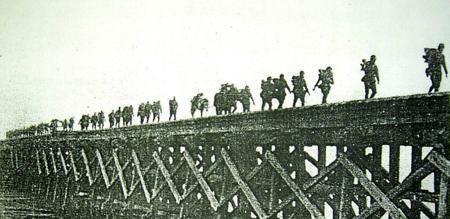Battle of Jiangqiao: The Japanese army issued an ultimatum to Ma Zhanshan, but he did not expect that Ma Zhanshan had no guns and no guns and had to resist hard
Text/No Counting Reading History
On November 4, 1931, the first Japanese attack on Jiangqiao was lost, but Ma Zhanshan was very worried
After the September 18 Incident, the Japanese army wanted to continue to occupy Chinese land, and they set their sights on Heilongjiang.
If you want to occupy Heilongjiang, you must occupy Qiqihar, and if you want to occupy Qiqihar, you must first take the Nenjiang Bridge.
The story we are telling today is a battle for the Nenjiang Bridge.

01 Beginnings
Zhang Xueliang's "no resistance" policy made the Japanese army very inflated, and they began to look down on the Chinese soldiers.
At first, they thought that taking Jiangqiao was a very simple matter, and even sent an ultimatum to Ma Zhanshan, the chairman of Heilongjiang, two days before the war.
But they didn't expect that this Ma Zhanshan was a big fierce person.
Even a great warlord like Zhang Xueliang retreated, and he dared to use the land of a province, no guns and no cannons, and resisted the Japanese army.
02 Go to war
"Then whoever invades our province will swear to die in a battle!" Ma Zhanshan expressed his attitude about him, and he quickly surrendered his troops to Jiangqiao and pulled up a line of defense.
On November 4, 1931, the Japanese army saw that Ma Zhanshan had no intention of retreating and brazenly launched an attack.
The roar of planes was heard in the sky, Japanese planes swooped down, bullets and shells constantly pouring down on the Positions of the Chinese Army.
The heavy artillery of the Japanese army also sounded at this time, and the heavy shells bombarded down, and the whole position was trembling.
What made the position tremble even more was that the Japanese tanks also drove out, and several tanks drove up, and the Japanese soldiers hid behind the tanks.
Undaunted, the warriors frantically fired at the enemy.
Ma Zhanshan also took out the only artillery and bombarded the Japanese troops on the bridge continuously.
However, the Japanese artillery fire was too strong, and the soldiers on the right wing could not hold on, and the Japanese rushed in.
The situation became critical, and the Japanese soldiers had rushed into the right wing positions of the soldiers.
The white-knife battle also began, and the warriors' bayonets, large knives, and various weapons continued to greet the Japanese body, and blood spilled all over the position.
Gradually, the Japanese soldiers could not hold back, the strong fighting spirit of the soldiers made them lose the idea of continuing to attack, and the Japanese army began to retreat.
"Fight!" Just as they were retreating, the soldiers who were ambushed on both sides opened fire brazenly, and the soldiers hid in the reeds, and the Japanese drove past without being found.
The Japanese soldiers fell to the ground.
03 Reinforcements
Japanese reinforcements arrived at this time, but they did not wait for the Japanese reinforcements to open fire.
A rushing horseshoe sound came, just as the Japanese soldiers watched.
In a puff of dust, the cavalry fighters of the Chinese army were firing their guns at them, and the Japanese soldiers fell down in blood.
Seeing that they were getting closer and closer to the enemy, the cavalry warriors drew their sabers, roared angrily, and swung at the Japanese soldiers, blood splattered.
The Japanese left a large number of corpses and began to retreat.
But they were not dead thieves, and in the middle of the night they secretly drove a boat to try to sneak attack the Chinese army.
They were greeted by bullets from the Chinese army, and the soldiers hid in the reeds and constantly opened fire on enemy ships, some of which were directly sunk and a large number of Japanese soldiers were washed away.
The plan of the sneak attack failed, and the Japanese army could only retreat.
The first battle of the Battle of Jiangqiao was fought beautifully, and Ma Zhanshan was also happy, but a trace of worry took root in his heart, Zhang Xueliang had no intention of supporting him, and he did not know how long he could hold out.
Resources:
"Legends and jiangqiao war of resistance", "Jiangqiao war of resistance: the first shot of anti-Japanese resistance after the 918", "918" incident and the Japanese invasion